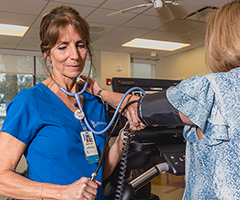Electrocardiogram (EKG/ECG)
What is an electrocardiogram or EKG/ECG?
An electrocardiogram, also known as an EKG or ECG, is a simple and painless test that measures your heart's electrical activity. As every heartbeat is triggered by an electrical signal that travels from the top to the bottom of your heart, it is a great way to assess the impact of a heart problem on your heart's electrical activity.
For example, it can show the heart's rate and rhythm. It can also detect decreased blood flow (cardiac ischemia), enlargement of the heart (hypertrophy), or the presence of either current or past heart attacks. The test's results also can suggest other disorders that affect heart function.
-
Cardiac Critical Care
At the first sign of a heart attack, every second counts. Our emergency cardiac care team is available 24 hours a day at our four adult hospitals.
When to get an EKG (ECG)
Your cardiologist will recommend an EKG (ECG) based on your medical history or current symptoms. Sometimes an EKG test is included in a routine exam for middle-aged and older adults, as they have a higher risk of heart disease than younger people. If you are presenting any of the below symptoms of a heart problem consult your cardiologist:
- Rapid Heartbeat
- Chest Pain
- Dizziness
- Fatigue
- Shortness of breath
- Arrhythmia
Additionally, you may need an EKG (ECG) to:
- Diagnose a heart attack
- Diagnose heart damage or heart failure
- Diagnose poor blood flor (ischemia) due to coronary artery disease
- Assess your heart rhythm to determine if you have an arrhythmia
- Confirm you are the right fit for an upcoming surgery
If you are currently seeing a cardiologist they may schedule you for an EKG (ECG) if you:
- Recently got a pacemaker
- Are taking medications for heart disease
- Recently had a heart attack
What to Expect from Your EKG (ECG)
During a resting EKG (ECG), a technician will attach 10 electrodes with adhesive pads to the skin of your chest, arms and legs. Men may have chest hair shaved to allow a better connection. You will lie flat while the computer creates a picture, on graph paper, of the electrical impulses traveling through your heart.
It takes about 10 minutes to attach the electrodes and complete the test, but the actual recording takes only a few seconds. Your ECG patterns will be kept on file for comparison with future ECG recordings.
Types of EKG (ECG)
Besides your standard EKG (ECG), your doctor may recommend a different kind based on your unique needs:
- Holter Monitor: A portable EKG (ECG) that monitors your heart's electrical activity for 1-2 days, 24 hours a day. Like a standard EKG, it is painless.
- Event Monitor: A portable EKG (ECG) used for weeks or even months. Used when your symptoms are sporadic and require readings at the time you experience symptoms.
-
Cardiology - Heart Institute at Cape Coral Hospital
-
Cardiology - Heart Institute at Sanctuary
-
Cardiology - Heart Institute at Medical Plaza One
-
Cardiology - Heart Institute at Metro Parkway
-
Cardiology - Heart Institute at Bass Road
-
Cardiology - Heart Institute at Coconut Point
Who to Contact for Your EKG (ECG)
If you would like to schedule diagnostic tests at Lee Health, contact us at (239) 424-1499.






















































































